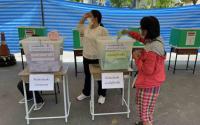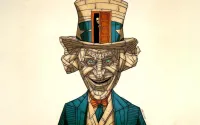19 Februay 2004Jim Muir
The week of campaigning that precedes the poll has stood in stark contrast to the 2000 election, which saw the reformist phenomenon at its peak.
 Gone are the noisy, exuberant election rallies |
Thousands of young people and women attended noisy, exuberant rallies.
But this year, there have been no colourful rallies, and hardly any public speeches.
Campaigning has consisted largely of election workers handing out leaflets in the streets and sticking posters on walls.
Although Iran is a land of surprises, most observers predict a low turnout.
Successful strategy
The election finds the reformists at their lowest ebb.
They have been unable to meet the expectations and hopes their election aroused among millions of Iranians hungry for change.
Most of their most prominent leaders have been disqualified from a contest in which they claim the right-wing vetting body, the Council of Guardians, has systematically eliminated competition in a majority of the constituencies, assuring the conservatives of an easy win.
 The closure of two papers was an ominous sign of things to come |
In last year's local elections - a contest in which the reformists swept the board in 1999 - voters stayed away in droves, allowing conservatives to win control by default because they can always count on a small bedrock support of regime loyalists.
Even before the sweeping eliminations, reformists were pessimistic about their chances of keeping a Majlis majority.
If the conservatives do regain control, it will mark one of the closing moves in a highly successful strategy aimed at winning back the ground seized by the reformists from 1997 on.
Their sights would then be set on taking the presidency when it falls vacant as President Mohammad Khatami's second term comes to an end in the summer of next year.
Hardliners strike back
When the reformists took parliament in 2000, millions of Iranians hoped that the combination of a massively re-elected reformist President and the new, liberal Majlis would see rapid moves towards greater democracy and freedoms, and a better life.
The conservatives were momentarily stunned by their defeat.
But it was not long before powerful hard-liners began striking back, using their two major strongholds - the Judiciary and the Council of Guardians - as a springboard.
The courts launched a concerted campaign against liberal political figures and journalists, and closed down dozens of reformist publications.
There was a permanent atmosphere of crisis, as arrests worked their way closer to the centre of reformist power.
The Council of Guardians, meanwhile, used its powers as the legislative watchdog to block reformist bills of any significance, including a two-pronged attempt by President Khatami to put through legislation that would have diluted the powers of the two unelected hard-line bastions.
The stunning coup carried out by the Guardians in eliminating such large numbers of reformist candidates in this election faced President Khatami and the moderate reformist centre with stark choices.
If they resigned, they risked abandoning the arena to the right wing and giving up the modest but significant gains they had made.
It would also have threatened the foundations of a system they believe must be changed slowly from within, not destroyed.
Questions of legitimacy
So the reformists compromised, leaving their more radical disqualified allies to their fate, and refraining from generating the kind of pressure on the Supreme Leader, Ayatollah Ali Khamenei, that might have obliged him to intervene more robustly with the Guardians in order to head off a real regime crisis.
 Turnout is likely to be low despite reminders |
All elections are numbers games, but in this one, the focus will be largely on the size of the turnout.
If the conservatives win with the small core of backing that gave them the local councils last year, there will inevitably be questions about their legitimacy and representativeness - all the more so, in view of the controversial machinations of the Council of Guardians.
But few observers expect an immediate crisis or immediate sweeping changes to follow, although the closure by the Judiciary of two reformist newspapers on the day before polling struck an ominous note for some.
A narrowly-based authority would theoretically leave the regime more open to outside pressures.
But conversely, foreign powers, including the US, might find it easier to swallow their democratic scruples and deal with a government that could deliver where the reformists were hamstrung.
The election campaign has seen signs of a coalescing of the centre, with moderate reformists making common cause with the "rational" conservatives.
But whether the triumphant hard-liners would allow significant change to take place is another question.
The focus of Iranian politics might shift to differences between pragmatic, traditional and hard-line right-wingers, as happened during the Rafsanjani era of the late 1980s and early 1990s.






